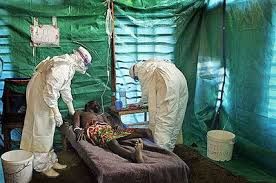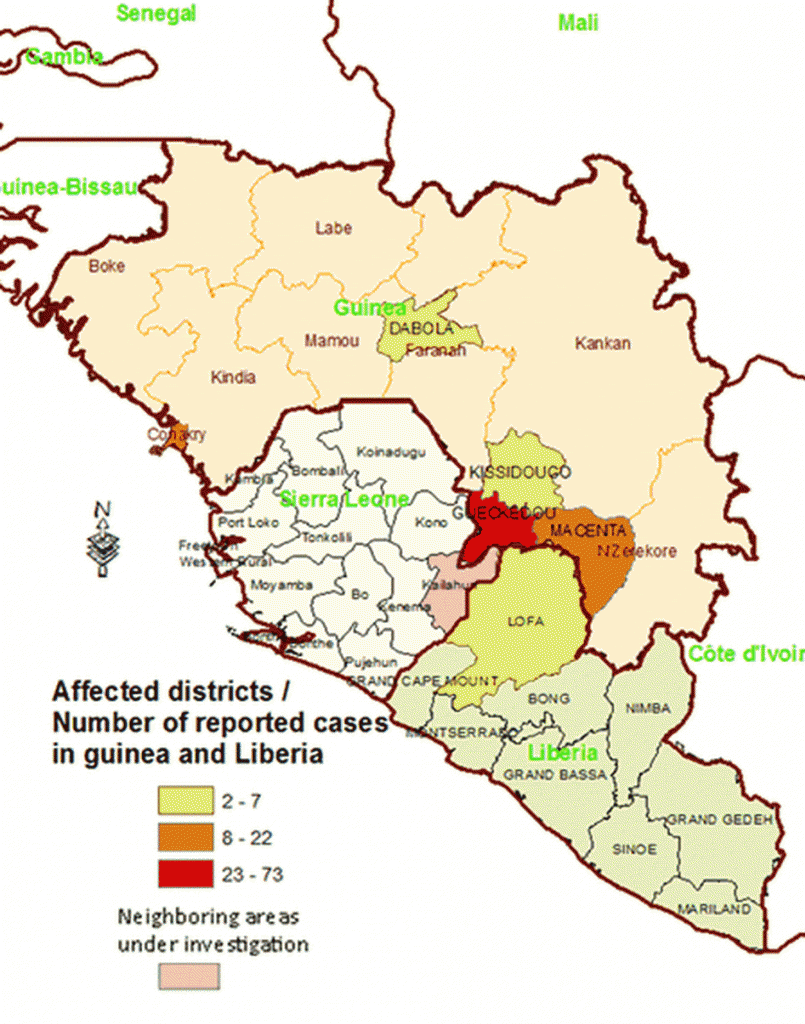
The Ebola Virus in West Africa Is New Strain, Scientists Say, and the outbreak in Guinea that has killed more than 120 people so far, probably did not spread there from other African nation in previous Outbreaks.
"The source of the virus is still not known," but it was not imported from nearby countries, said Dr. Stephan Gunther of the Bernhard Nocht Institute for Tropical Medicine in Hamburg, Germany.
He led an international team of researchers who studied the genetics of the virus and reported results online Wednesday in the New England Journal of Medicine.
The four previously known fatal strains of the virus cause internal and external bleeding and organ failure and have a mortality rate between 30 and 90 percent. Up until know this outbreak was thought to have been caused by the deadliest Zaire strain, which has a 90% mortality rate. There are no vaccines or cures, although patient survival can be improved with fluid replacement therapy.
"It is not coming from the Democratic Republic of Congo. It has not been imported to Guinea" from that country or from Gabon, where Ebola also has occurred, Gunther said.
Researchers think the Guinea and other strains evolved in parallel from a recent ancestor virus. The Guinea outbreak likely began last December or earlier and might have been smoldering for some time unrecognized. The investigation continues to try to identify "the presumed animal source," they write.

This next story reads more like an adventure reported in the New Yorker, as Dr Sanjay Gupta, Senior Medical correspondent for CNN News, dresses up in the Ebola protection suits and enters a special Ebola containment tent housing dying patients.
We're aliens in Ebola's world Even CNN is now covering this story. Remember Kossacks, we've been covering here for over 3 maybe 4 weeks by now.
Inside Ebola isolation ward in Guinea
This is a long narrative as he walks through the ward, so it is difficult to summarize. I'll give you three paragraphs as a teaser:
The wards are a cluster of unassuming white tents in the middle of a large field, not far from the center of the city. Each is just big enough to hold around 10 cots. Two layers of zippers keep the outside from getting in, and more importantly here -- the opposite.
Nobody goes inside the tent without spending 15 minutes putting on isolation gear. The nurse handing over my garb calls it my "space suit."
I can't help but think that going into an Ebola isolation ward is a little bit like going to the moon.
In H.G. Wells' "The War of the Worlds," seemingly invincible invaders from Mars are laid low by Earth's microbes, for which they have no defense. With Ebola, we humans are the invaders. The sense of being an alien in the world of this virus is jarring.
Drs. Sanjay Gupta, left, and Tim Jagatic don isolation gear outside an Ebola ward in Conakry, Guinea.
Outside the tent, the air is sticky and has a distinctive smell of bleach. The bleach is in large plastic jugs; people use it liberally to wash their hands.
It mixes with the smell of smoke, wafting from an enormous pit in the ground, full of smoldering ashes. I am told everything that comes out of these wards is burned: the suits we're wearing, the sheets off the cots, even the human waste. Take no chances. Nothing kills better than fire. After the 2012 Ebola outbreak in Uganda finally ended, medical teams scorched the earth.
The patients inside the tent are infected with one of the most deadly pathogens in the world. Ebola has no treatment, no vaccine and no cure.

In the last two days we have seen two bits of good news. Guineas reports that the number of new cases is falling, and our second articles reports a dual vaccine of rabies and Ebola vaccines combined has conferred immunity to mice in a laboratory setting.
Sarah DiLornzo, of the Associated Press, reports from Dakar Senegal, that the World Health Organization, WHO, says the Death Toll in Ebola Outbreak Rises to 121,
As of Monday, the U.N. health agency said it had recorded a total of 200 suspected or confirmed cases of Ebola, the majority of which are in Guinea. That figure includes some of the Mali cases that the government now says are negative. The organization said the deaths of 121 people in Guinea and Liberia have been linked to the disease. ...
Officials have said the current outbreak could last months.
Zee News of India reports Gambia bans flights from Ebola-hit nations, from landing in its territory leaving many travelers stranded. The WHO has expressed that such restrictions are not necessary.
Staff at Banjul International Airport said on condition of anonymity that President Yahya Jammeh had ordered airlines to cancel all flights from Guinea, Liberia and Sierra Leone in a bid to prevent the spread of the deadly virus.
"This decision by the Gambian authorities has left prospective passengers travelling to Banjul ... stranded in these west African countries," said an airport official, speaking on condition of anonymity. ... "Brussels Airlines, which transits in Freetown from Europe, is only allowed to drop passengers there, but not pick anyone up." ...
The outbreak began in the impoverished country's southern forests, but has spread to Conakry, a sprawling port city on the Atlantic coast and home to two million people Neighbouring Liberia has reported 20 probable or suspected cases, six lab-confirmed cases and 13 deaths. Mali also had suspected cases but was given the all-clear on Tuesday after samples taken from patients tested negative for Ebola in laboratories, the health ministry told reporters in Bamako. There was no official confirmation of the ban from the Gambia but AFP has seen a letter dated April 10 from the transport ministry notifying airlines of the measures while Sierra Leone's government said it was in talks with Banjul over the issue.

Dennis Thompson As Ebola outbreak spreads, vaccine remains years away. This article also reports progress on fluid replacement therapies, to improve a patients probabilities of surviving.
But scientists say they are beginning to close in on ways to stop the virus. Several promising vaccines and medications are under development, although all are still years from availability, said Dr. Anthony Fauci, director of the U.S. National Institute of Allergy and Infectious Diseases (NIAID).
The most promising efforts to develop an Ebola vaccine involve genetic splicing, Fauci said. In this line of research, NIAID investigators and several pharmaceutical firms are pursuing separate research that would insert part of Ebola's genetics into an existing vaccine-ready virus. ... This strategy, called a viral vector, takes advantage of the ability of viruses to efficiently infect cells.
Instead of delivering a payload of illness, these modified, harmless viruses would deliver a nonthreatening piece of Ebola's genetics in hopes of triggering an immune response that would create antibodies to protect against future Ebola infection.
"You take another virus and you take the particular gene of the Ebola virus for which you want to prompt immunity, and you insert that gene into the virus," Fauci explained.
Mathais Schnell, Director of the Jefferson Vaccine Center indicates it will still be years to develop a "vaccine that would be appropriate for humans. Still this encouraging news will provide hope to many frightened West Africans.
Also impressive, is the idea of combining the Ebola vaccine with the rabies vaccine, because rabies is an enormous problem in Africa while statistically Ebola is quite rare. So vaccines could meet the cost/benefit criteria based on the rabies analysis, and the Ebola immunity could piggyback in as a "free-rider."
Other positive new include improvements in treatments of infected patients improving survival rates including fluid replacement and antiviral medications.
These kind of viral outbreak stories provide some of the best examples where there is no substitute for having strong well funded and trained health professionals protecting our health at places like the Centers for Disease Control, the World Health Organization, and even the FDA, and many other agencies. Next time you hear a Tea Party zealot spouting off in the company lunchroom, or church picnic about how we can shut down all government and be better off, drop some Ebola facts on his or her sorry stupid ass.
Our sympathies and best wishes go our those afflicted, their loved ones and communities. Let's all hope and pray for continued progress in containment, treatment, and eventually even prevention of this terrible scourge.


